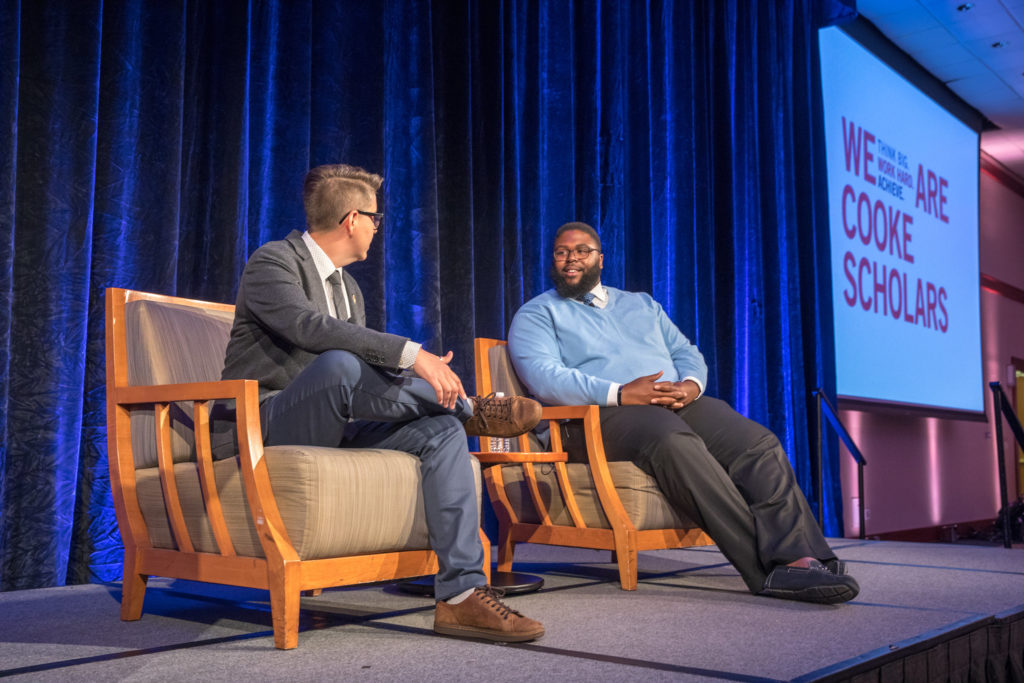Elementary Excellence Gaps & Reconsidering Student Supports

September 13, 2019 – Here’s what we’re reading this week about the issues affecting high-achieving students. The significance of social networks, child care, and other non-traditional supports are described by advocates in K-12 and higher ed. Also, read about excellence gaps and researcher recommendations for educating talented students equitably.
Receive the Cooke Chronicle each week in your inbox: Subscribe here.
High-achieving high school seniors can now apply for the Cooke College Scholarship Program, and the Cooke Undergraduate Transfer Scholarship is accepting applications from community college students preparing to transfer to a four-year institution. Both programs provide up to $40,000 per year, as well as comprehensive educational advising and access to the thriving Cooke Scholar community.
Elementary & Secondary Education:
- In Kudos, Karen Rambo-Hernandez describes her recently published research, co-authored by Scott Peters and Jonathan Plucker, on how excellence gaps in reading and math change over time.
- “Most gifted low-income kids are much less likely than affluent children with similar academic abilities and potential to get access to the kinds of programs that will help them flourish,” states Jonathan Wai and Frank C. Worrell in Chalkbeat. The researchers suggest reforms to New York City’s gifted programs, such as universal screening and early identification across all schools, in place of total elimination of the programs.
- “Every year during Back to School season, parents and caretakers dutifully stock up on school supplies to help their children thrive in the coming year, but there is another incredibly valuable, yet intangible, tool that many parents give their children as they head off to school: a network of support,” writes Nicole Lynn Lewis in the Catalogue for Philanthropy blog.
Higher Education:
- New research on public flagship institutions finds that “they aren’t providing affordable, accessible education for low- and middle-income students,” reports Inside Higher Ed. “This results in some students taking out large loans, working long hours while attending school and facing difficulty covering basic needs such as food, all of which can lead to poorer outcomes for the students.”
- In The New York Times, the editorial board critiques legacy admissions and Anthony Abraham Jack describes how students with financial need require support beyond financial aid to be successful.
- NPR explains the conclusions of a new report from the Government Accountability Office, which found that “about two-thirds of those schools [with programs for student-parents] did not mention on their websites that students could apply for more aid to help pay for child care.”
Cooke Foundation Highlights:
- Students selected for James Madison University’s Valley Scholars program, a Cooke Foundation grantee, describe how support from the scholarship, its organizers, and fellow Valley Scholars has motivated them to persist in The Washington Post.
- Cooke Scholar Sylvie Douglis produced three episodes about “How To Succeed At College” for NPR’s Life Kit.
- Derrick Nantz, adviser for the Carolina Student Transfer Excellence Program (C-STEP), speaks to The James G. Martin Center for Academic Renewal about how the program’s regular advising provides community college students with connections to peers and a clear transfer pathway to the University of North Carolina at Chapel Hill. C-STEP began in 2006 with a Cooke Foundation grant.
- The Foundation is accepting proposals for the Good Neighbor Grant program from nonprofit organizations in the Washington, DC metropolitan area that help students develop their talents and intellectual curiosity. Selected grantees will receive a one-time grant of between $10,000 – $35,000. Details on program eligibility and the application process are here.
Social Media Spotlight:
Planning to transfer from community college and finish your bachelor’s degree? Our scholarship provides high-achieving #comm_college students with up to $40,000 annually, plus comprehensive educational advising: https://t.co/CJ3jF6LiA6
Add us to your @CommonApp! pic.twitter.com/SJgt8ECw3Y
— Jack Kent Cooke Foundation (@TheJKCF) September 10, 2019
Photo header: Cooke Scholar Melissa Osborne speaks with Anthony Abraham Jack at Scholars Weekend 2019.